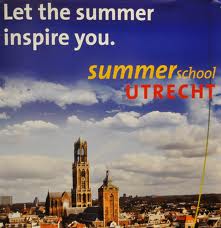Utrecht Summer School 2012
Maria Ravlik and Veronika Kostenko tell about their participation in the School
 Utrecht University is one of the leading European research centers in the field of quantitative social science. Every year this University organizes the Summer School, which lasts for almost 3 months and gets together a lot of students from all over the world. This year junior research fellows of LCSR Maria Ravlik and Veronica Kostenko participated in the Utrecht Summer School and wrote about their impressions for our website.
Utrecht University is one of the leading European research centers in the field of quantitative social science. Every year this University organizes the Summer School, which lasts for almost 3 months and gets together a lot of students from all over the world. This year junior research fellows of LCSR Maria Ravlik and Veronica Kostenko participated in the Utrecht Summer School and wrote about their impressions for our website.
International Summer School is an important event for the small town of Utrecht. Welcoming posters for participants are hung on main streets, and the office of the school is located in the very center of the town. Organizers of the School try to introduce participants of different programmes to each other and unite them, so students were offered a variety of entertainment programs from canoeing across channels of Utrecht to presentation of national cuisines. The school offers a wide range of various courses not only in sociology, but also in cultural studies, economics, law and natural science. Classes take place in campus buildings of the University, which are located in different corners of a town, but organizers try to settle students near the campus where their classes are held.
Maria Ravlik: This summer I took part in the Utrecht University Summer School. The topic of the course was “Migration, Integration and Ethnic Relations”. The course was built in an interesting way: 8 days were divided by 4 lecturers (two days for each). Every lecturer presented a new theoretic approach and practical workshops. Thus, the four lecturers had an opportunity to introduce their research interests to the participants. This approach appeared to be fruitful, since not all students were familiar with migration studies. Every scholar gradually plunged us into his world of research questions and objectives. Such topics as factors of international migration, cross-country attitudes towards migrants, ethnocentrism, influence of radical right parties in Western Europe, and ethnic relations were discussed during the course. All students were divided into 5 groups at the beginning to participate in the workshops and article discussions. During the workshops, two groups were supposed to prepare presentations with a short summary of certain articles, the other two groups made critical reviews of those articles and the last group had to make evaluations of the presentations of previous groups. My participation in the school was very helpful not only to complete my project on the factors of migration, but also to formulate the idea of a new project about rising right-wing extremism in Europe and migration related issues, which I .jpg) am going to present at November conference of LCSR.
am going to present at November conference of LCSR.
I also want to mention special atmosphere of the University campus, where modern architecture is combined with agricultural landscapes, where sheep and rabbits freely graze around the University campus.
Veronica Kostenko: I took a course called “Multivariate Analysis”. This program aims to explain principal statistical techniques in non-boring way using a witty and informal textbook of Andy Field. Such an approach lets teachers set free of seriousness which is usually a part of teaching statistics, and explain difficult techniques using funny and real life examples. Nevertheless, the schedule was really intensive, a typical day started at 9 a.m. with an hour-long session, during which the materials of a previous day were reviewed through play. After that all the students went to another building and listened to a theoretical lecture for 3 hours. After dinner participants were split into 3 groups and practiced applications of theory to the analysis of real data during computer labs. The day finished at 5 p.m. but after that students had to work on reading assignments for a few hours to get prepared for the next day.
On weekend we took a trip to Amsterdam, visited all the principal museums (Rijksmuseum, Museum of Vincent Van Gogh and House of Rembrandt) and went on a boat trip along the channels. In general it was an excellent course, which helped me to put in order information that I had and receive new knowledge and experience.
by Maria Ravlik and Veronica Kostenko
